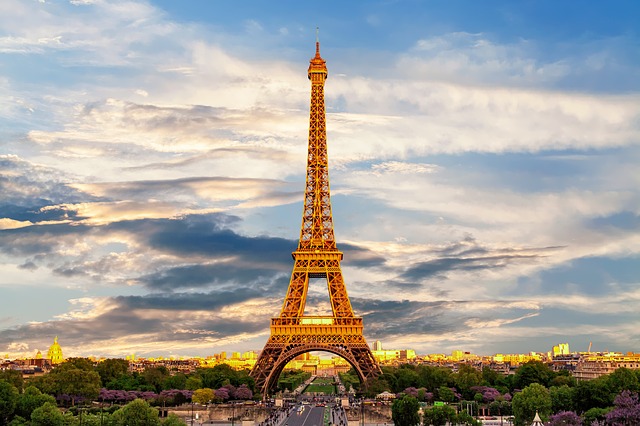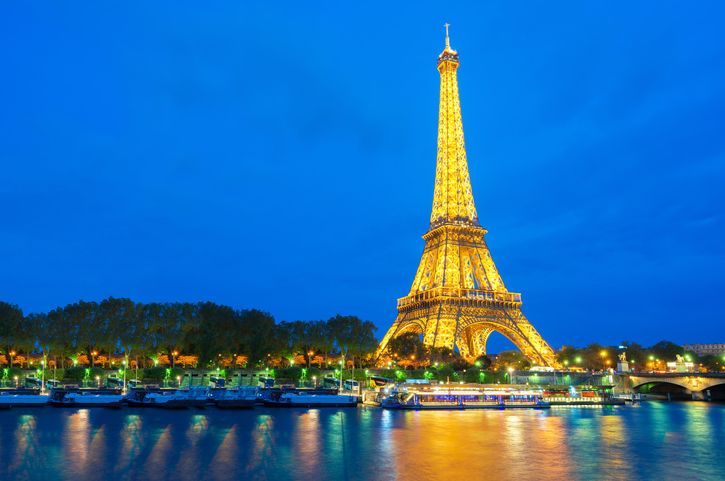A symbol of Paris, the Eiffel Tower towers over the city of love. An iconic and romantic landmark, the Eiffel Tower in Paris has an interesting history. It was originally built in 1889 for the World Fair and was a hit. Sir John Bickerstaffe, mayor of Blackpool, was so in awe of it, he built Blackpool Tower in Lancashire, England. Find out more intriguing facts about the Eiffel Tower below. Questions like where is the Eiffel Tower and who built the Eiffel Tower are common enough, but the Eiffel Tower’s history has much more in store.

Also Read: Here Are The Top 11 Things To Do In Paris
12 Interesting Facts About Eiffel Tower In Paris
- The Eiffel Tower has up to two floors and various entertainment options like a restaurant, interactive touch screens, and more. You can either take the steps or the lift whose trips are eight minutes apart. These lifts travel a total of 1,03,000 kilometres annually, that’s two and a half times the circumference of the Earth.
- The tower is more flexible than you think. In cold weather, the Eiffel Tower in Paris shrinks by approximately six inches. If it is very windy, the Eiffel Tower even sways up to two or three inches.
- As of 2018, around 250 million people have visited the Eiffel Tower in Paris since it opened.
- As incredulous as it sounds, a con artist Victor Lustig managed to ‘sell’ the Eiffel Tower as scrap metal, twice.
- The tower was built for the World Fair to show the world France’s industrial skill and expertise. The original plan was to dismantle the Eiffel Tower after 20 years. Since it was also useful as a radio antenna and wireless telegraph transmitter, it was not torn down.
- The above-mentioned transmitters played a role in World War II, leading to the win of the Allied Forces. In 1914, during the First Battle of the Marne, the transmitter in the Eiffel Tower jammed German radio communication which obstructed their attacks.
- The Eiffel Tower in Paris was supposed to be torn down as per Hitler’s orders. During World War II, France was occupied by German forces and Hitler issued orders to Dietrich von Choltitz, the military governor of Paris in 1944 to demolish the tower. The general refused to do so, and later French resistance fighters retaliated by cutting the Eiffel Tower’s lift cables. This made the Nazis climb the tower and hoist their flag.
- The cables were also cut as the Eiffel Tower in Paris was closed to the public. The Nazi soldiers wanted to attach a huge swastika at the top, but because of its size, it was blown away. They then went on to attach a smaller one.
- The engineers, mathematicians, and scientists who contributed to conceptualising, designing, and building the Eiffel Tower in Paris are honoured with inscriptions of their names on the side of the tower.
- The Eiffel Tower was also used as a marketing gimmick. Between 1925 and 1934, a French car manufacturing company Citroen used 2,50,000 light bulbs to form their name. This went on the Guinness Book of Records as the biggest advertisement.
- The Eiffel Tower in Paris has a secret room and military bunker. The military bunker has now been turned into a museum and leads to Ecole Militaire through a tunnel. You can go on a tour that takes you through it.
- The Iron Lady or La Dame de Fer is the title used to refer to both the Eiffel Tower and Margaret Thatcher.

The Wonder
It is also believed that Gustave Eiffel (if you are still wondering who built the Eiffel Tower, it was him) also designed some of the interior elements of The Statue of Liberty. The Eiffel Tower has many interesting facts right from its inception. If you are wondering how tall Eiffel Tower is, it is 324 metres from base to tip. The beautiful landmark holds many secrets.


